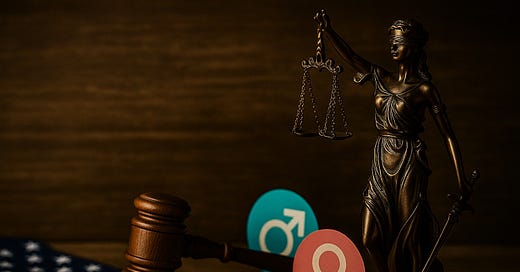The Supreme Court Gets It Right: Thomas, Barrett, and the Courage to Say No to Social Experimentation
In a 6-3 decision that will no doubt set social media on fire for days, the Supreme Court handed down a ruling in United States v. Skrmetti that reaffirms what a lot of us already know: The Constitution doesn’t give federal judges the power to referee every controversial policy debate. Especially not the ones that belong squarely with voters and their elected representatives.
At the heart of this case was Tennessee’s right to protect children from medical treatments that come with irreversible consequences and, as the Court noted, rest on shaky scientific ground. The plaintiffs tried to argue that Tennessee’s law violated the Equal Protection Clause because it allegedly discriminated against transgender youth. The Court didn’t buy it. Instead, the justices applied rational basis review, the most basic standard of constitutional review, and found that the state had a perfectly legitimate reason for the law.
But what really stood out in this ruling were the voices of Justices Clarence Thomas and Amy Coney Barrett.
Thomas: A hard truth about science and power
Justice Thomas wrote a concurring opinion that cut right to the core of what’s happening in this debate. He reminded us that trusting “expert consensus” without question has led this country down some dark roads. He pointed to the eugenics movement of the early 20th century as a perfect example.
“When legislation does not cross constitutional lines, States must have leeway to effect the judgment of their citizens, no matter whether experts disagree,” Thomas wrote. “And, when this Court has nonetheless given exalted status to expert opinion, it has been to our detriment. Past deference to expertise provided the theory of eugenics added legitimacy and considerable momentum, with this Court throwing its prestige behind the eugenics movement in its 1927 decision upholding the constitutionality of Virginia’s forced-sterilization law.”
That line hits hard. Here is Clarence Thomas, a Black man on the highest court in the land, calling out the dangerous arrogance that comes when we let so-called experts make moral decisions for the rest of us. He’s absolutely right. The eugenics movement had the backing of the best and brightest at the time. It had the approval of the courts. And it left a shameful mark on our history. The parallels to what we see today in the aggressive push for medicalized gender transitions in kids are impossible to ignore. Once again, we are being told not to question the experts, no matter how serious the consequences.
Barrett: The steady conservative voice
A lot of folks on the right have questioned whether Amy Coney Barrett is as conservative as they hoped when she joined the Court. If you’re one of those people, I encourage you to read her concurring opinion in this case. Barrett didn’t just agree with the majority’s decision. She explained why the Court must be careful not to give judges more power than the Constitution allows. She pointed out that if the Court applied heightened scrutiny to Tennessee’s law, it would open the door for judges to second-guess all sorts of policy decisions that legislatures are supposed to make. That’s not conservatism in name only. That’s the real deal.
Barrett’s opinion was thoughtful, clear, and firmly rooted in the proper role of the judiciary. She showed the kind of backbone that conservatives should be proud of.
What this ruling really means
Some on the left will say this ruling denies care or harms vulnerable kids. But that’s not what happened here. The Court simply said that states have the right to be cautious. They have the right to make decisions about complicated and controversial issues without having to answer to unelected judges.
What the Court did was remind us that these questions about children’s health, medicine, and morality belong in the hands of the people and their representatives. Not in the hands of experts who demand we trust them without question. Not in the hands of activists who want to shut down debate. And not in the hands of courts that were never meant to make these decisions in the first place.
Clarence Thomas’s words about eugenics will stick with me. We’ve seen what happens when we let “expert consensus” trample on individual rights and common sense. This time, the Court held the line. And for that, we should all be grateful.




